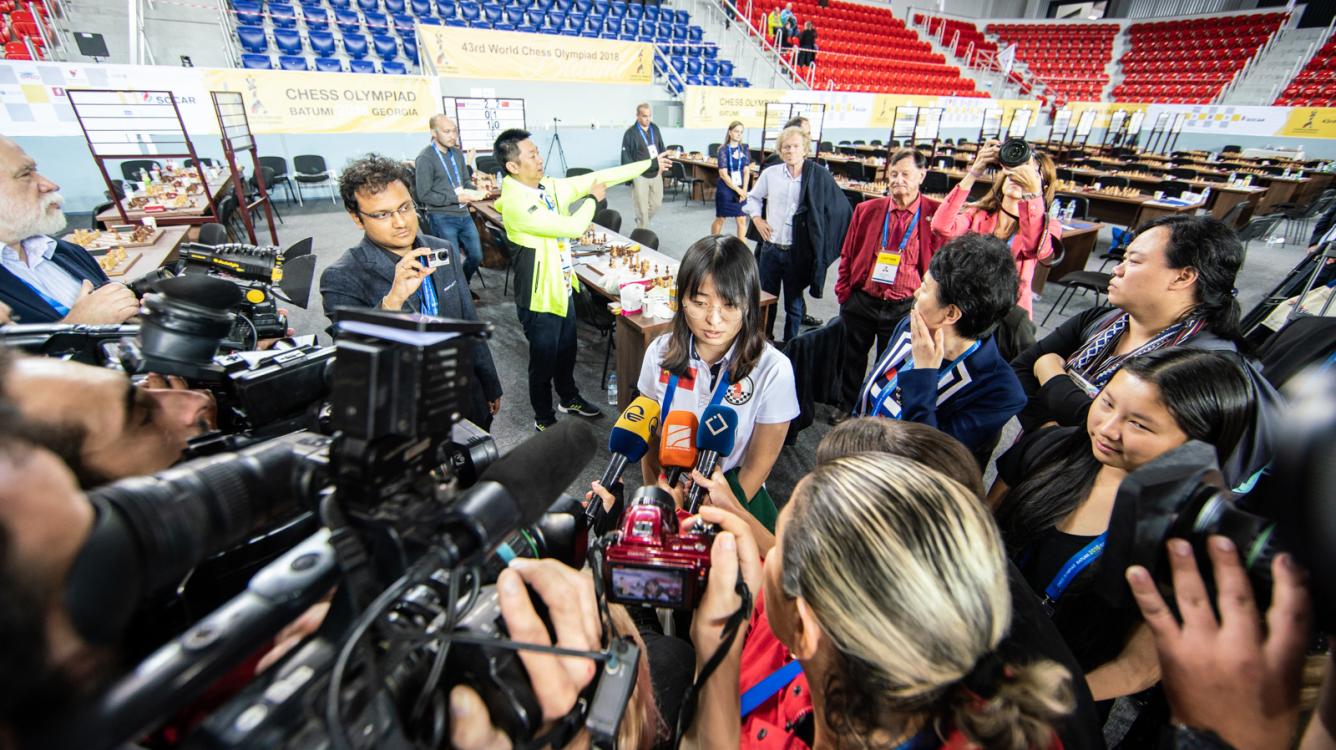
Chess Olympiad 2018: China Wins Double Gold
China is Olympiad champion once again. Actually, twice again.
Today in Batumi, Georgia, the open section squad won its second team gold medal in the last three Olympiads. The women's team survived a late repetition claim and successfully defended its title from 2016 in Baku. Both sections went to tiebreaks, but China emerged victorious in both after all the results came in.
Note that this report focuses on today's games. A separate, pictorial report on the closing ceremony will be posted here tomorrow.
In the final round of the open section of the 2018 Chess Olympiad, all draws between China and the U.S. left the two teams still knotted. Just like in 2016, the gold medal would come down to tiebreaks. Unlike 2016, team USA did not come out on top.
Although its players trailed the U.S. on tiebreaks going into the round (324.5-320.5), China's previous opponents outperformed the U.S's past foes, and first place switched as a result. The final calculations were China: 372.5 and U.S.: 360.5. The Americans settled for silver after being the top-ranked team going into the event, with the second-highest average rating in history.
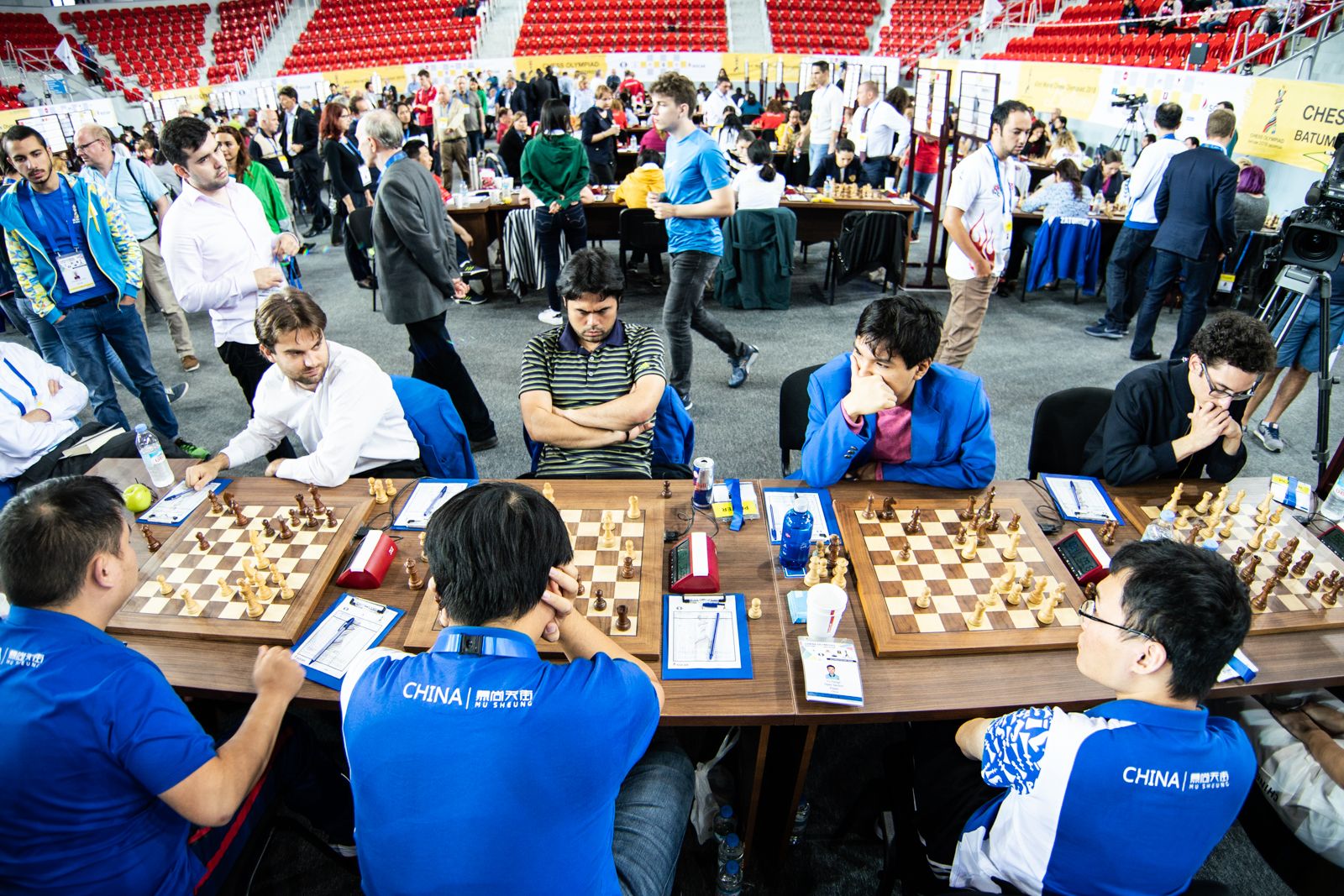
The U.S. squad was only good for silver this time. | Photo: Maria Emelianova/Chess.com.
Last Olympiad we benefited from the tiebreak system; this time unfortunately, we didn't. Nevertheless, silver is a good result and I'd like to thank all my team members for their dedicated work. Congrats to China on gold in the Open and Women's sections!
— Fabiano Caruana (@FabianoCaruana) October 5, 2018
Russia beat France on board two to also get to 18 points and equal the U.S. and China, but its relatively weaker schedule early in the tournament cost the team. Russia began and ended the day well behind the U.S. and China in tiebreaks (354.5 was its tally), and took bronze.
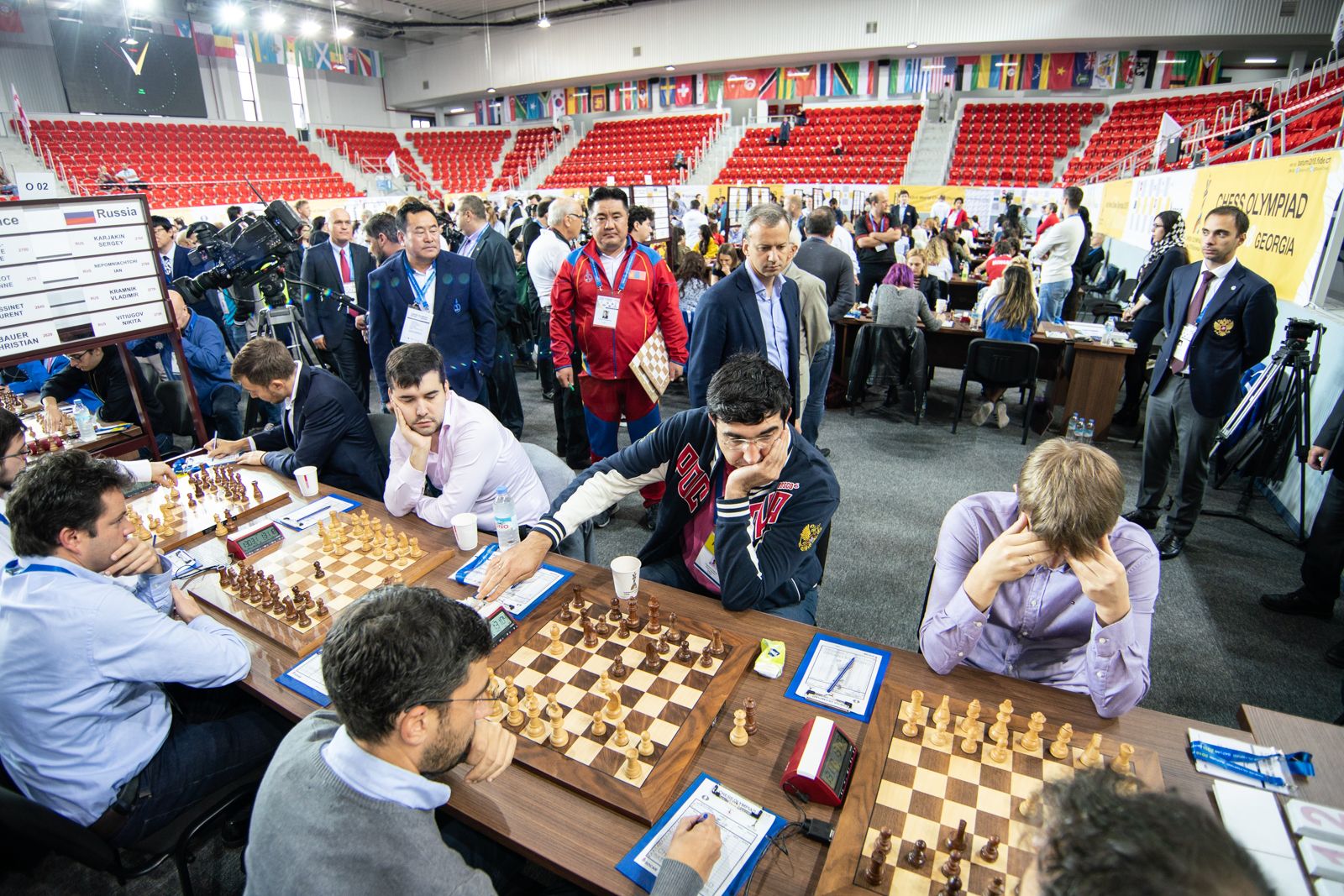
After silver in 2004, 2010, and 2012 and bronze in 2016, another bronze was won by the Russian team that last won gold in 2002. | Photo: Maria Emelianova/Chess.com.
The hard-luck team of the event is Poland. The surprise of the tournament nearly led wire-to-wire, but then lost yesterday and tied India today to fall just off the podium in fourth. Poland played every one of the top eight teams in the open section! As a result, its tiebreaker was actually even ahead of all three nations tied for first, but alas, it couldn't get to 18 match points for that to matter.
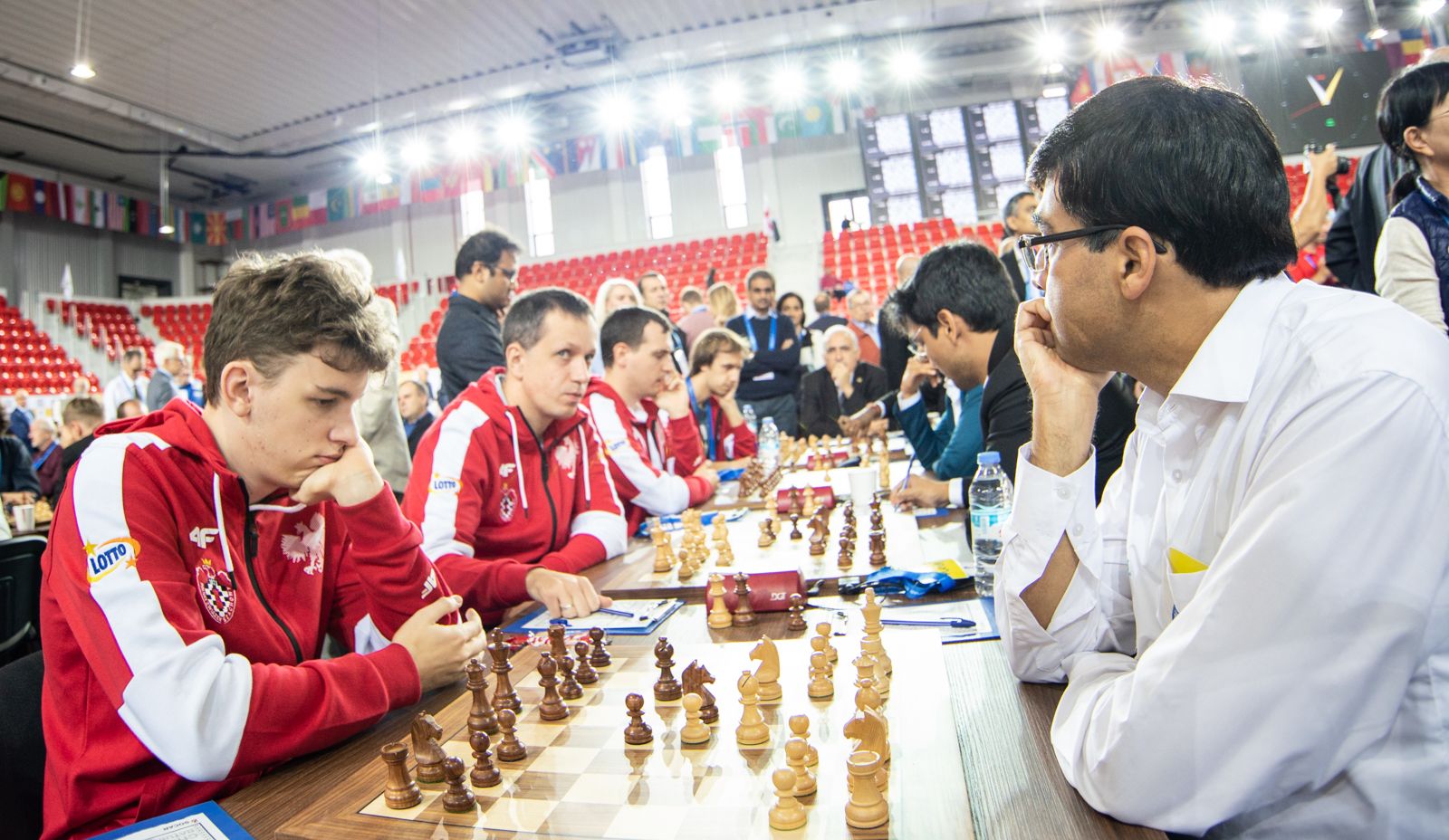
Poland can be very proud with just one loss against so many great teams. | Photo: Maria Emelianova/Chess.com.
Today was largely a day for math instead of chess. Much of the marquee action was curtailed early. The world's top players seemed to want their teammates to do the fighting today, as GM David Smerdon pointed out:
The five board-one games in the top five matches of the last round end in draws before any of the other top 50 games. Did the 2800s make a restaurant reservation or something? #BatumiChess2018
— David Smerdon (@dsmerdon) October 5, 2018
That factoid naturally included the top board, in the only matchup of two 2800s. Fabiano Caruana and Ding Liren would both try to pace their nations on the final day, but like the other board ones, the game fizzled early.
Caruana labored to find a way to avoid a repetition, but ultimately decided that avoiding it would not be prudent.
"I didn’t want to end the game yet," he told Chess.com just after his game. "Boards two and four will be drawn almost certainly. Probably 95 percent. Hikaru is a bit better and even if we tie there’s still a chance.” But as we now know, that chance is gone.
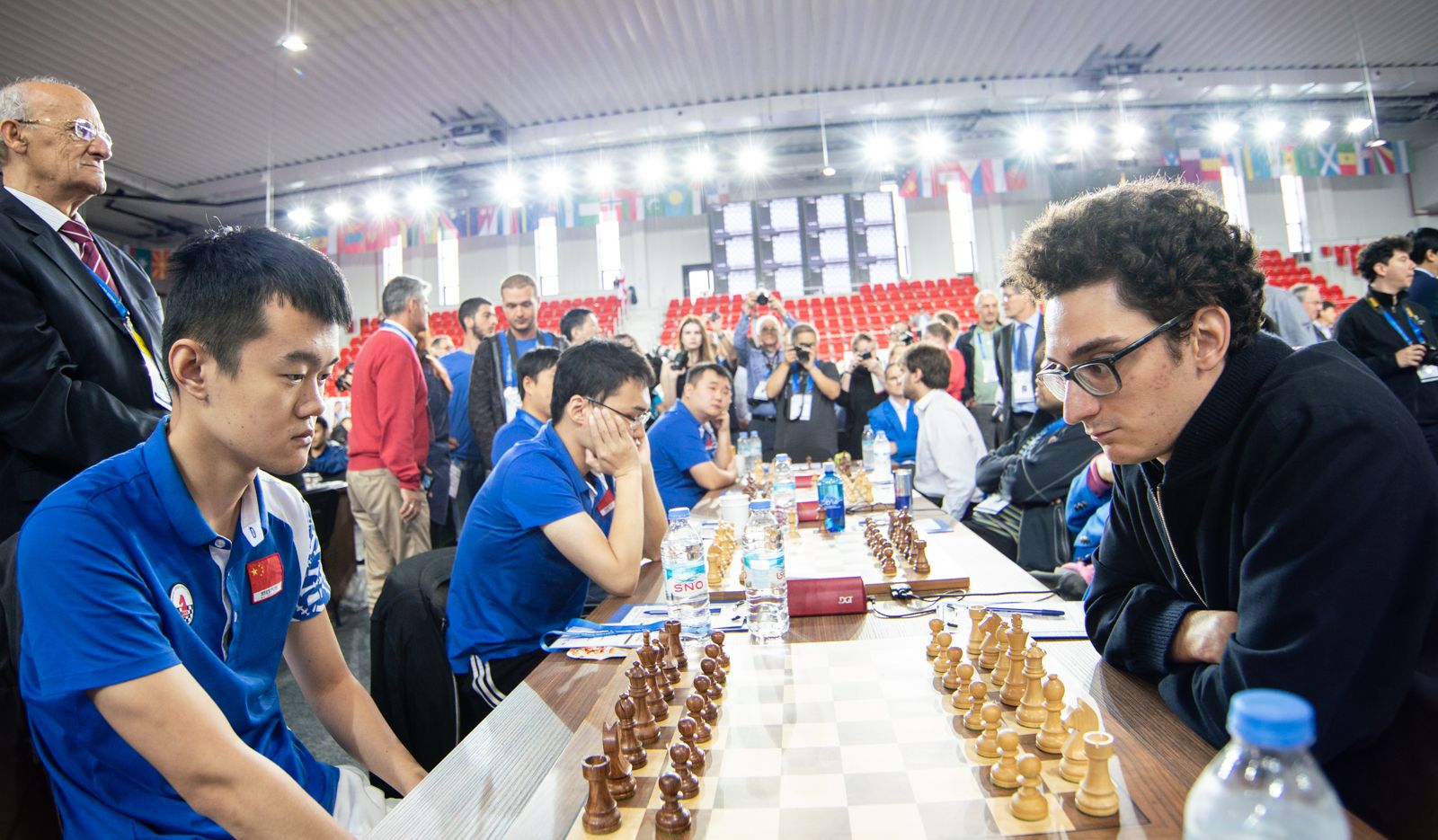 A game between 2800s: Caruana vs Ding. | Photo: Maria Emelianova/Chess.com.
A game between 2800s: Caruana vs Ding. | Photo: Maria Emelianova/Chess.com.
How could Caruana be so sure that both of the even-numbered board would be drawn? Well, they were exactly the same for 16 moves!
"I actually thought this might happen because the Chinese players sometimes have the same repertoires," he said. His estimate proved true as both ended in draws in the endgame.
Ding Liren explained more to Chess.com: "Yu (Yangyi) prepared for this specific line, and Li (Chao) just followed him!"
The same position in Yu-So (where 17.Bg5 was played), and Li-Shankland (17.Bf4).
But still one dynamic game remained. Hikaru Nakamura, sitting on only an even score and uncharacteristically benched in the penultimate round, was inserted back into the lineup. And he had White. U.S. team captain John Donaldson said that re-inserting him was an "easy choice."
Nakamura also banded together with Caruana for his prep, at least in a small way.
"He seemed motivated before the round when we were on the bus," Caruana said about his teammate, adding that they discussed the specific h4 lunge used by Nakamura in the game.
At a critical juncture, Nakamura labored to decide if he should go pawn grabbing, or continue his spatial expansion and development. He chose the latter, as it was clearly safer, but instead his game ended drawn, too.
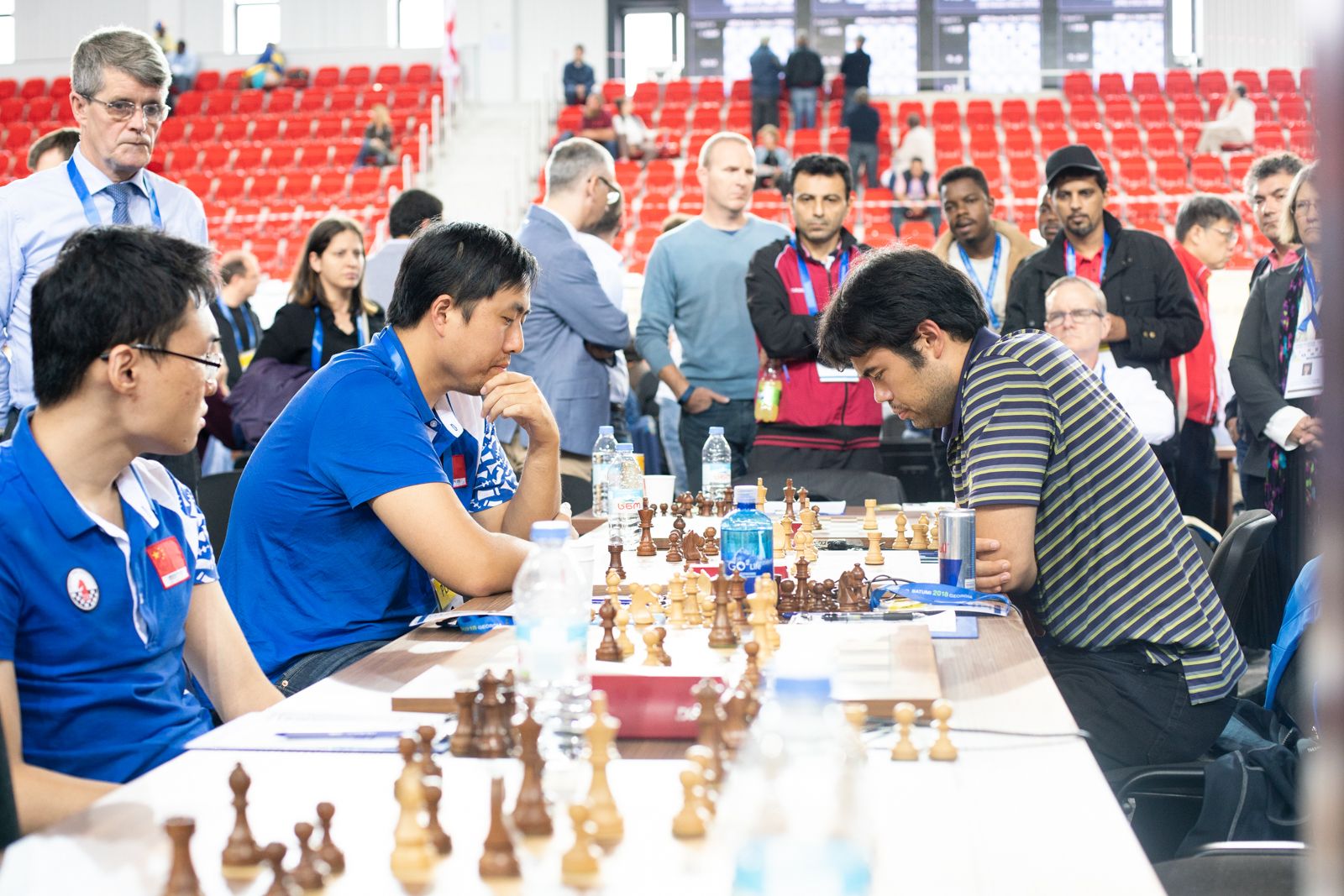
Nakamura vs Bu was a potential decider for gold, but ended in a draw as well. | Photo: Maria Emelianova/Chess.com.
He told Chess.com that if he knew China was flipping the tiebreaks, he would have played something different. The opacity of the math in real time is the culprit; for team Sonneborn-Berger there are 11 individual opponents of each team that factor, and you'd also have to know the results of those matches, which were usually still in progress. Tiebreak two is much easier to calculate: game points. U.S. and Russia finished on 29 while China scored 28.5.
"If I had known we were down, I would have gone insane earlier in the game," Nakamura said.
"Losing to Poland was a huge blow," Caruana said. "We played a great Olympiad. It was just that one hiccup."
Donaldson thought the strength of competition was much higher this year than in 2016. In Baku, the team scored 20 out of a possible 22 match points, as did Ukraine; this year no team even got to 19. But what ultimately hurt was how all the final-round opponents did, and China's simply outperformed the U.S.'s opponents.
"Some of our horses are not running strong in this round," Donaldson said as he watched the returns. "I think we played a good tournament but left a little bit unfinished."
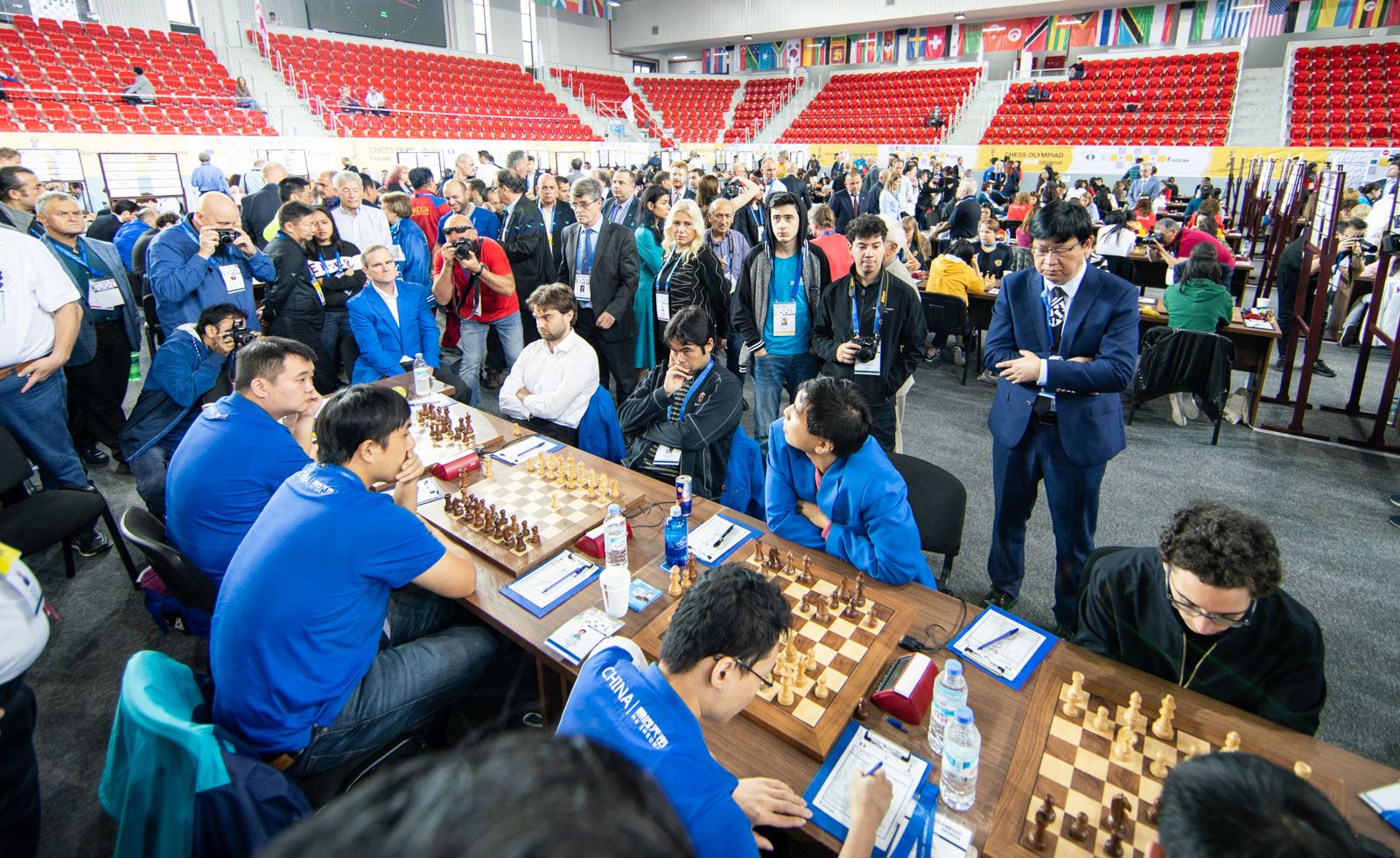
Donaldson sitting right of Shankland. | Photo: Maria Emelianova/Chess.com.
Particularly harmful was the slim 2.5-1.5 win over Georgia 3 early in the event. And the fact that the 4-0 win over Panama in the opening round was the one score "dropped" since Panama ended as the lowest-performing team the U.S. played. (If you really want to know the vagaries of the team Sonneborn-Berger methods, we invite you to consult the final news report of the 2016 Olympiad, where a match very far down the standings made all the difference).
Sam Shankland performed well on board four but finished just off the individual podium. Here are his thoughts on the last two weeks, keeping in mind that at the time of the interview the match results and final medals were not known, so he won't get to be the one to raise the cup again.
Chess.com's interview with Sam Shankland.
Bronze medalist Russia completed its podium comeback today by besting France 2.5-1.5. Ian Nepomniachtchi's win was the only decisive game of the 16 battles of the top four matches. And if the final mating pattern looks familiar, that's because you read the earlier report with Alexander Fier's similar idea.

Nepomniachtchi (pink shirt) won a nice attacking game today. | Photo: Maria Emelianova/Chess.com.
England can be satisfied too with its fifth place, and the same can be said for 27th seed Vietnam (seventh), 32nd seed Sweden (11th), 36th seed Uzbekistan (16th) and 40th seed Egypt (19th).
Fourth seed Azerbaijan disappointed with 15th place. Tenth seed Israel and 13th seed Netherlands finished below their standards as well, right beside each other on the 39th and 40th places.
Chess.com's interview with Vishy Anand.
By drawing the world championship challenger, Ding Liren not only helped his team but himself. He maintained his hold in the individual gold medal on first board, with a TPR of 2873, the second-highest of any player in the event. Caruana takes silver and Anish Giri played all 11 games in earning the bronze.
On board two, Ngoc Truong Son Nguyen takes gold while Nepomniachtchi earns silver and Teimour Radjabov bronze.
Board three actually produced the most prodigious performance rating in town, and it was needed to best a world champion! Jorge Cori of Peru and his 2925 TPR earns a gold. Vladimir Kramnik gets silver and Kacper Piorun bronze.
On board four, Daniel Fridman gets gold, while Jacek Tomczak walks away with silver and Bu Xiangzhi bronze.
For the alternate board, Anton Korobov wins gold. Ilya Smirin earns silver and Christian Bauer bronze.
In some final news, Qatar did not show up and therefore lost to Kuwait 4-0 but Chess.com could not confirm if the early start time was the culprit or if there was some other reason. The Qatar team is one of the delegations staying at an elite hotel but which is one hour's drive away.
The final round also saw a pairing that hadn't happened before at an Olympiad: team IBCA (the International Braille Chess Association) vs team ICCD (the International Chess Committee of the Deaf), or simply put, vision-impaired players against hearing-impaired players. The IBCA won 2.5-1.5.
| Rk. | SNo | Team | Team | TB1 | TB2 | TB3 | TB4 |
| 1 | 3 | China | 18 | 372,5 | 28,5 | 149 | |
| 2 | 1 | USA | 18 | 360,5 | 29,0 | 147 | |
| 3 | 2 | Russia | 18 | 354,5 | 29,0 | 144 | |
| 4 | 11 | Poland | 17 | 390,0 | 28,0 | 158 | |
| 5 | 9 | England | 17 | 340,0 | 27,5 | 142 | |
| 6 | 5 | India | 16 | 388,0 | 29,0 | 156 | |
| 7 | 27 | Vietnam | 16 | 379,5 | 30,5 | 138 | |
| 8 | 8 | Armenia | 16 | 371,0 | 27,5 | 152 | |
| 9 | 7 | France | 16 | 366,0 | 28,5 | 153 | |
| 10 | 6 | Ukraine | 16 | 337,0 | 26,0 | 152 | |
| 11 | 32 | Sweden | 16 | 333,0 | 29,0 | 135 | |
| 12 | 15 | Czech Republic | 16 | 331,5 | 27,5 | 143 | |
| 13 | 16 | Germany | 16 | 317,5 | 27,0 | 139 | |
| 14 | 35 | Austria | 16 | 300,5 | 27,0 | 133 | |
| 15 | 4 | Azerbaijan | 15 | 402,5 | 29,5 | 159 | |
| 16 | 36 | Uzbekistan | 15 | 341,0 | 30,5 | 135 | |
| 17 | 23 | Iran | 15 | 337,0 | 28,5 | 138 | |
| 18 | 12 | Hungary | 15 | 321,0 | 26,5 | 139 | |
| 19 | 40 | Egypt | 15 | 298,5 | 26,0 | 135 | |
| 20 | 25 | Greece | 15 | 295,0 | 26,5 | 134 |
The women's tournament was an even more dramatic affair, which involved the last game that finished in the playing hall. And it wasn't just any game; it was the top board of the all-decisive match.
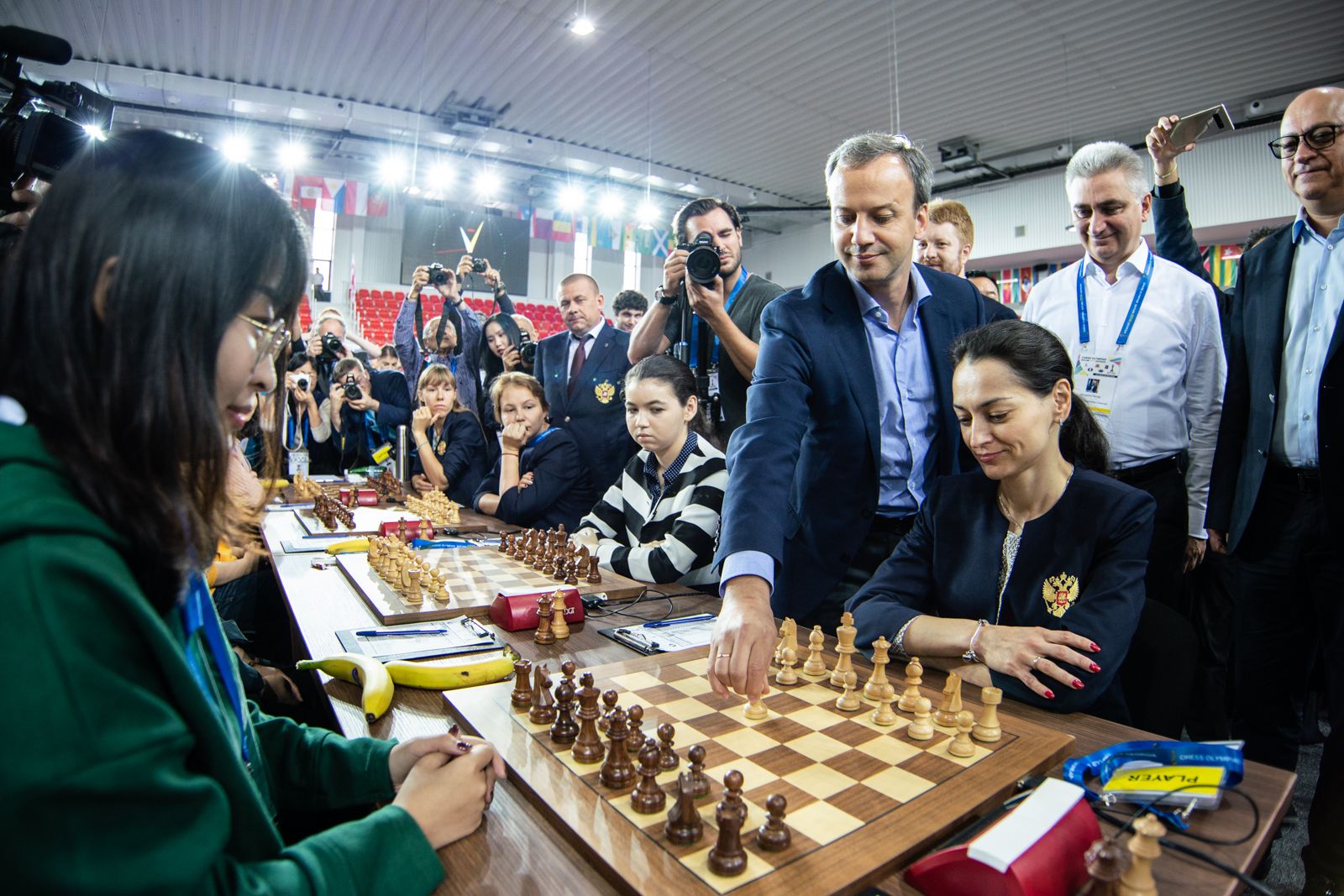
Newly-elected FIDE president Arkady Dvorkovich played the first move for Alexandra Kosteniuk in her game with Ju Wenjun, which would eventually go on until the rest of the playing hall was empty. | Photo: Maria Emelianova/Chess.com.
China vs Russia became a crucial match, due to the other results among the top boards. After about two hours of play, the situation was that with two boards having won positions and at least one draw from the remaining boards, Russia was going to beat China.
That was excellent news for Ukraine, in second place, who was likely going to beat team USA and take over while the other team on 16 points, Armenia, wasn't going to win its match as it quickly lost on the top two boards against Georgia one.
On board one, Elina Danielian was already worse when she blundered a double attack vs Nana Dzagnidze:
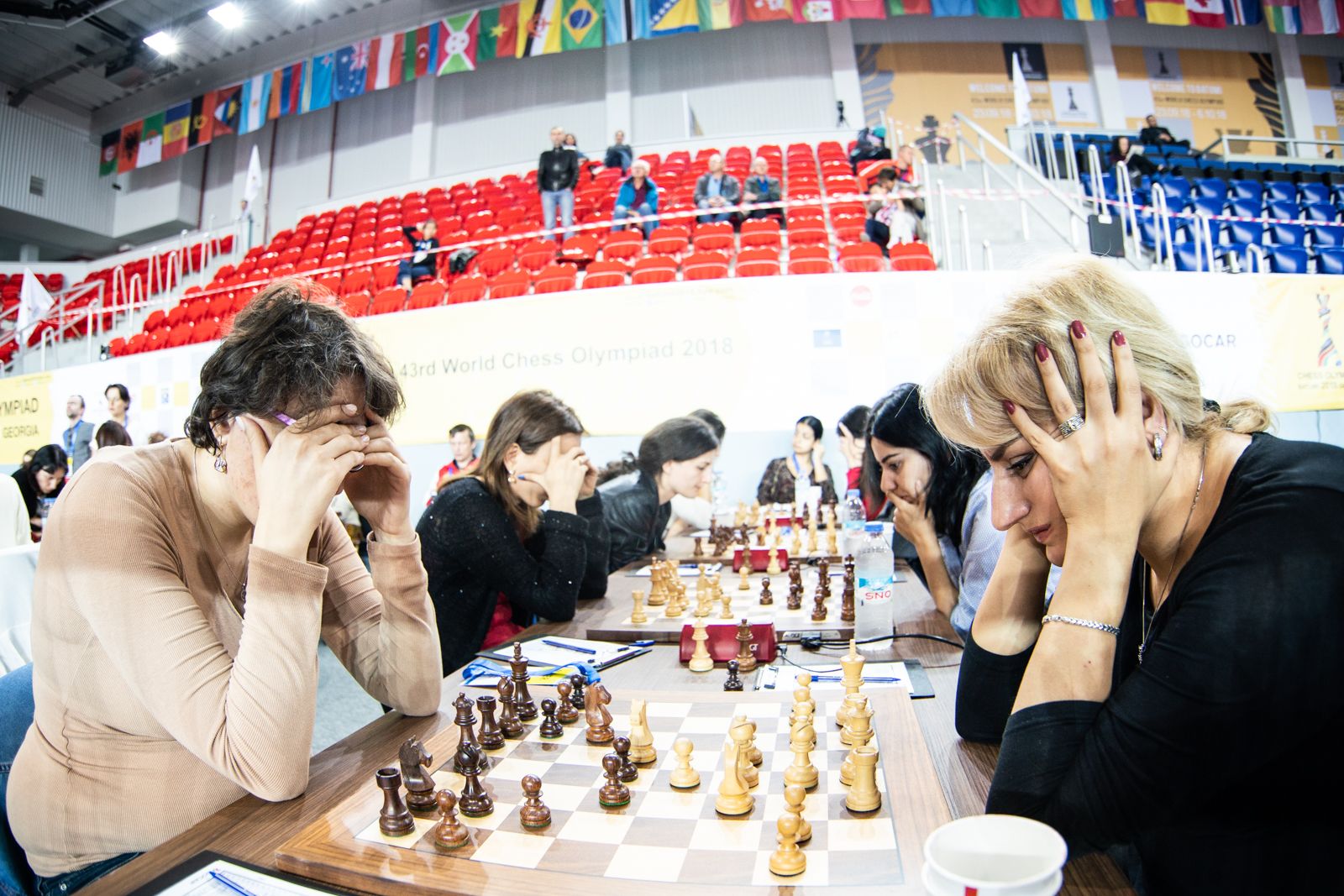
Georgia one won in the final round vs Armenia. | Photo: Maria Emelianova/Chess.com.
Boards three and four eventually were drawn, so Armenia was out of contention. Ukraine was busy beating the U.S., killing its medal hopes along the way and heading to gold itself, or so it seemed.
The Muzychuk sisters won their games on boards one and two, GM Anna Ushenina lost to WGM Tatev Abrahamyan (who finished her tournament strongly with 3.5/4) but GM Natalia Zhukova managed, where 10 others had failed, to beat FM Jennifer Yu in a tense game where she was so nervous that she missed a number of quicker wins.
Ukraine's second gold (after the first in 2006 in Turin) seemed a certainty, but Zhukova didn't celebrate. Instead, she stayed in the playing hall, keeping an eye on China-Russia all the way till the end of the last game. What she saw was the desired medal turning from gold into silver.

Zhukova watching as a spectator. | Photo: Maria Emelianova/Chess.com.
The score was 1.5-0.5 for Russia, thanks to a good win for GM Aleksandra Goryachkina vs IM Shen Yang and a draw between GM Valentina Gunina and WGM Huang Qian.
After Zhukova-Yu had finished, Alexandra Kosteniuk vs Ju Wenjun seemed to be heading to a draw, and Olga Girya was completely winning vs Lei Tingjie. That couldn't go wrong, or could it?
As it went, Girya failed to finish it off, and eventually her nerves got the better of her. With two passers on the sixth rank, she allowed a perpetual.
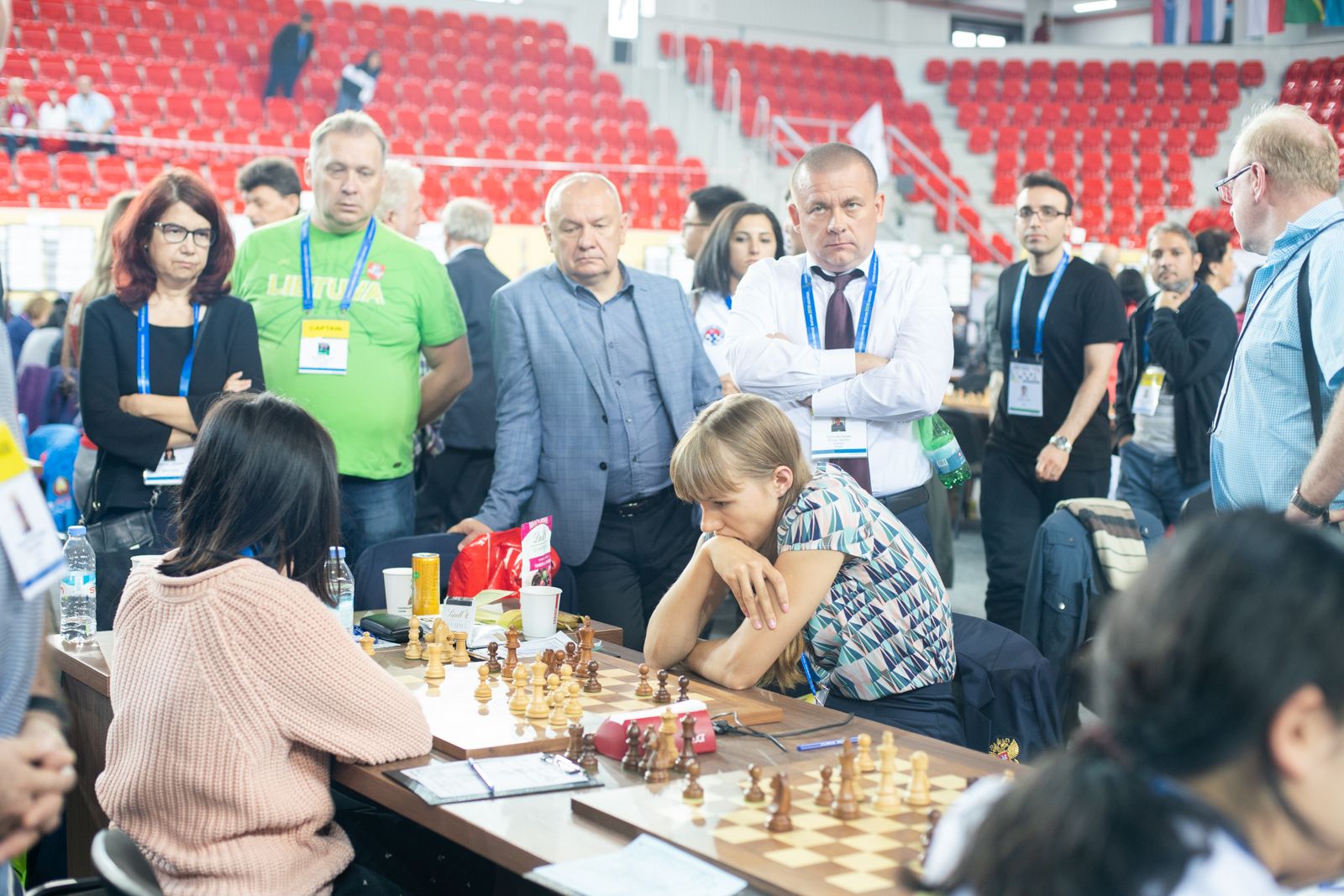
Olga Girya failed to win a completely winning game. | Photo: Maria Emelianova/Chess.com.
It was still possible for Ukraine, since Kosteniuk, now defending a QN-QN ending a pawn down, might still hold the position. But Ju was making progress, and it started to look critical.
A few dozen spectators and several big TV cameras were fighting for spots around the board, while being chased away by the furious Russian team captain GM Sergey Rublevsky and the arbiters.

Lots of spectators and media gathered around the board. | Photo: Maria Emelianova/Chess.com.
The spectacle took a new turn when Kosteniuk suddenly claimed a three-fold repetition. In a small twist of geopolitical irony, Ukraine's victory depended on a Russian claim.
The match arbiter stopped the clock and started to reconstruct the game (thereby making the mistake of allowing the players to think on about their game while the clock wasn't running).
At some point, chief arbiter Takis Nikolopoulos returned into the playing hall and ordered the arbiter to go through the game with the players. The claim turned out to be incorrect.
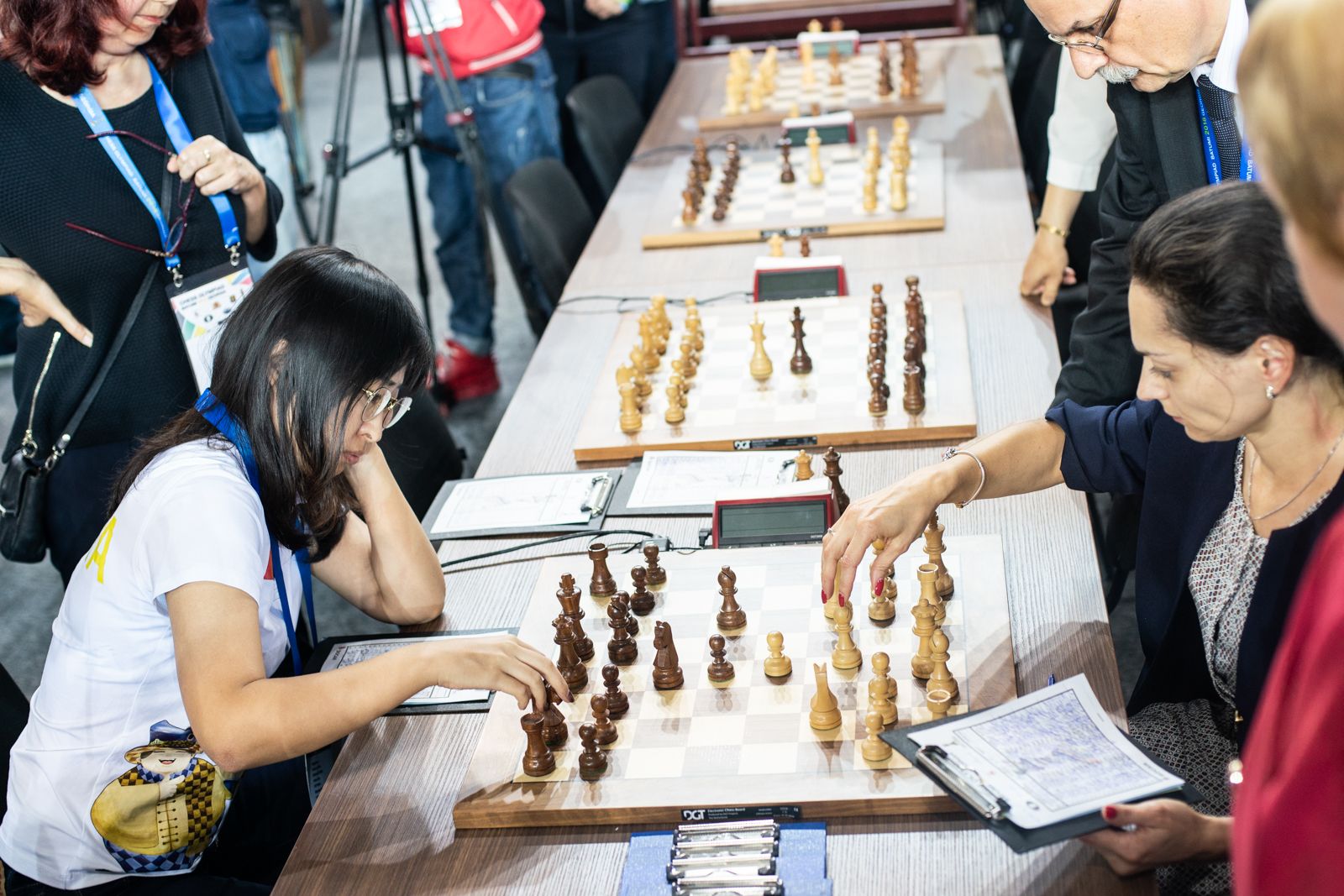
The players going through their game, to check Kosteniuk's claim. | Photo: Maria Emelianova/Chess.com.
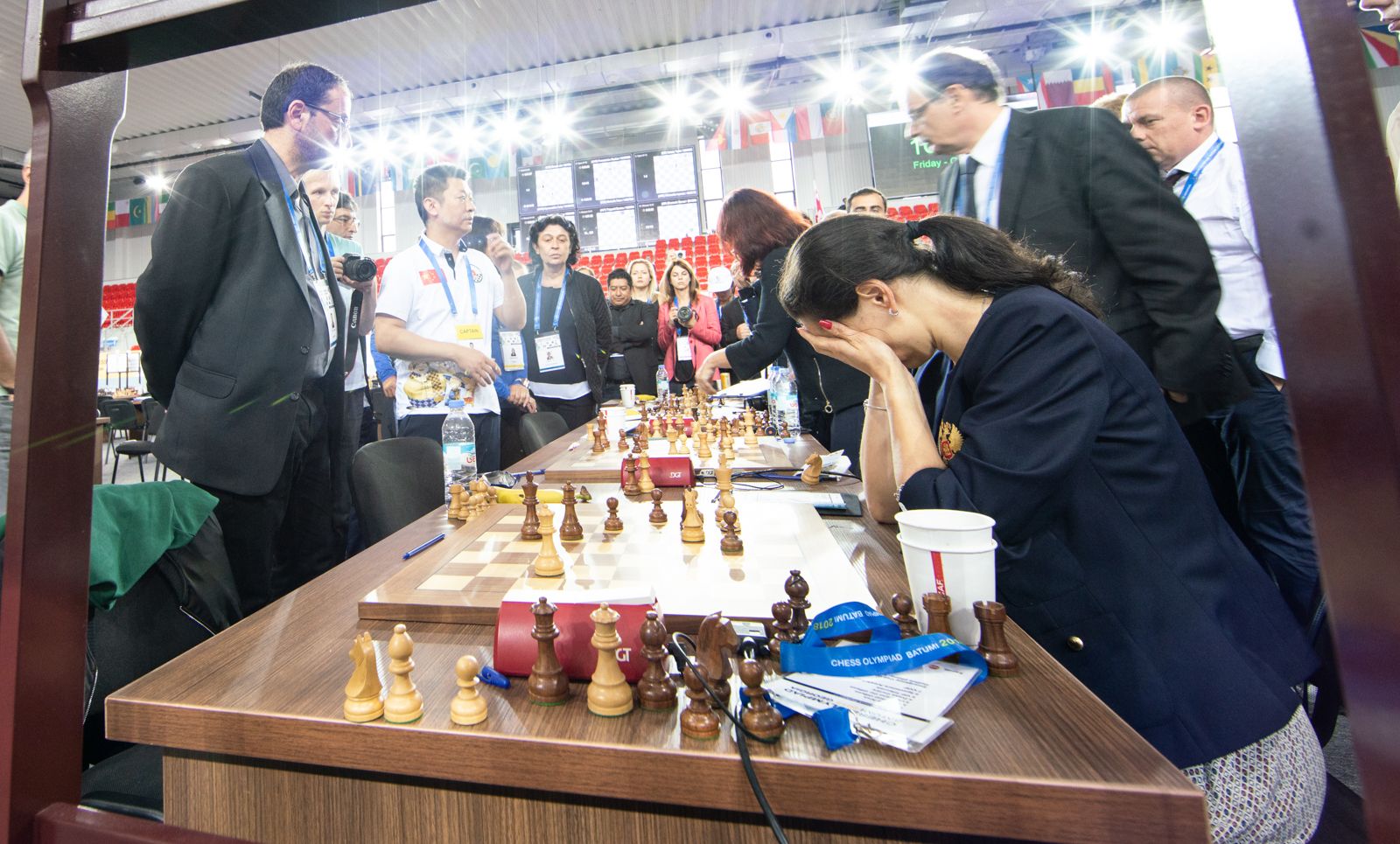
Kosteniuk, when she heard her claim was incorrect. | Photo: Maria Emelianova/Chess.com.
With extra time on the clock for Ju, the game continued. Kosteniuk seemed to have distracted herself mostly. She failed to concentrate fully and soon made the ill-fated decision to play actively.
She maneuvered her knight to a worse square, which allowed Ju to win material. As Ju said in an interview with Chess.com, she hadn't seen a win yet if White had just waited.
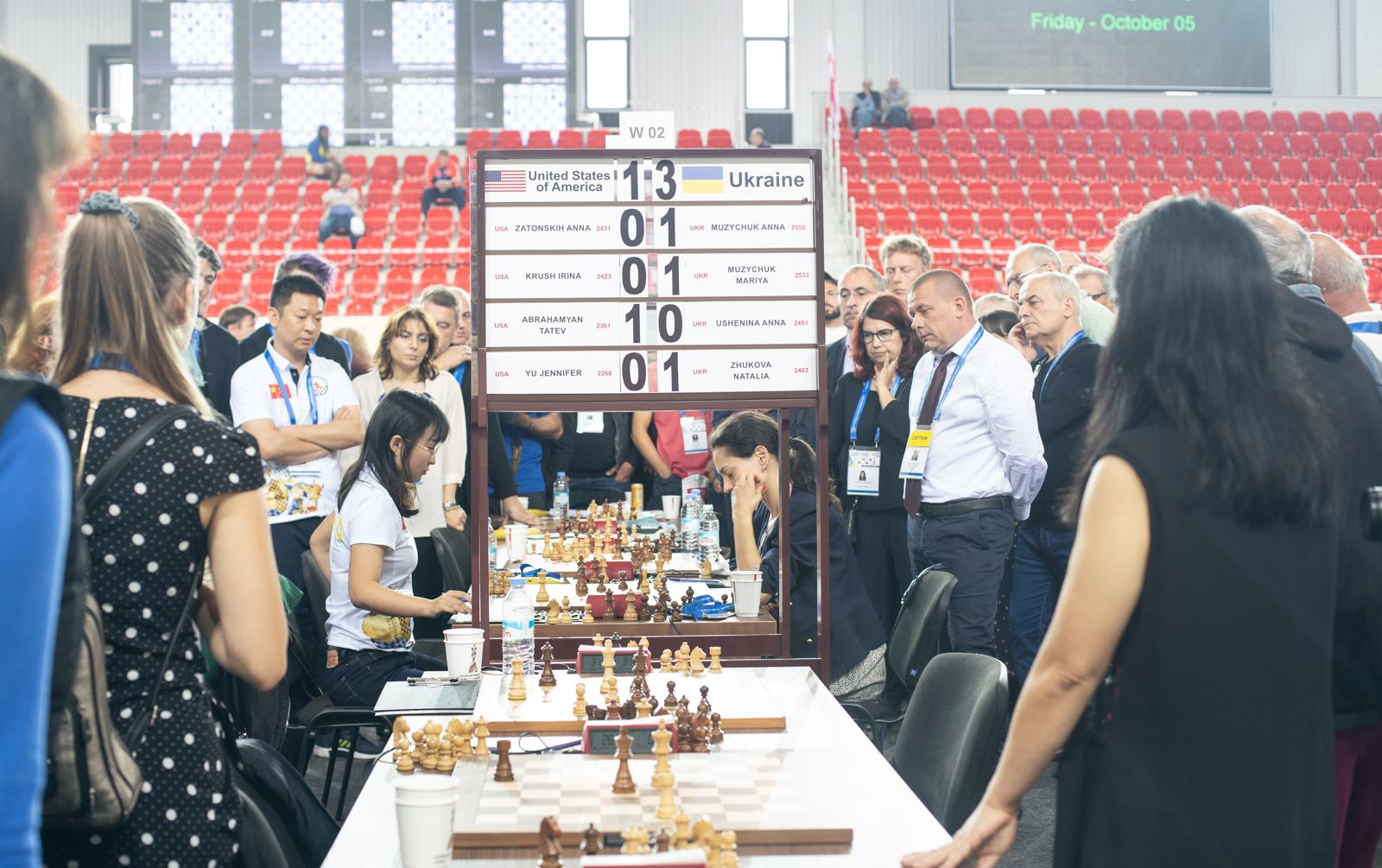
The final moments of this big game. | Photo: Maria Emelianova/Chess.com.
With all other boards in the playing hall finished, small applause could be heard. A tie with Ukraine had been established and it was hard to believe that Ukraine, with a worse Sonneborn-Berger tiebreak after the penultimate round (329.5 vs 343.5), could have improved that in just one round. Soon, a full confirmation came that China was indeed the winner.
Today China managed to achieve something only the old Soviet Union had previously achieved in chess history: a double gold at an Olympiad. Last time that happened it was in December 1986, when only two of the ten Chinese players were born and they were both in their infancy.
— Olimpiu G. Urcan (@olimpiuurcan) October 5, 2018
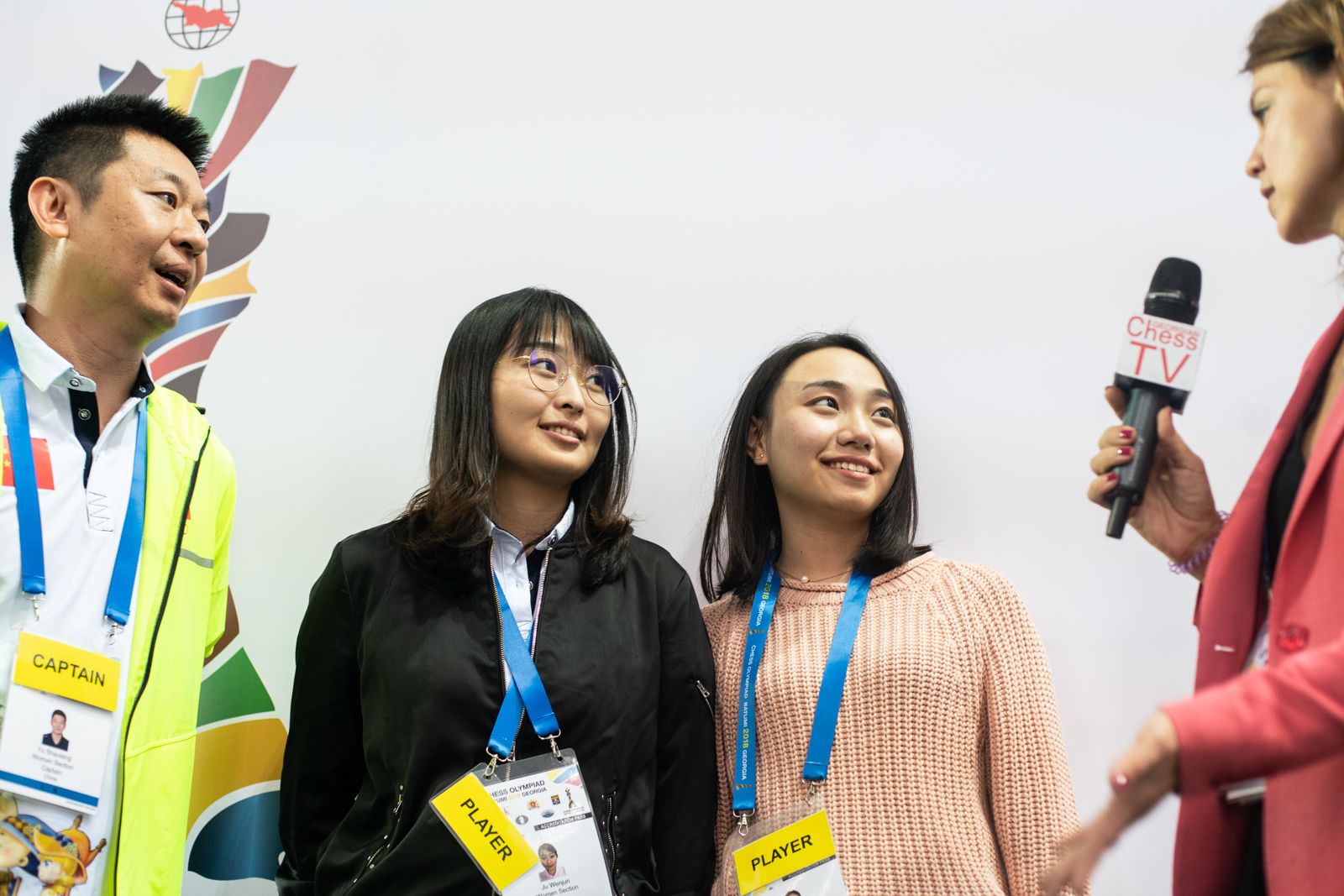
Ju and Lei interviewed, with team captain GM Yu Shaoteng on the left. | Photo: Maria Emelianova/Chess.com.
Ju also took the gold medal for board one, ahead of Hungary's Hoang Thanh Trang and Georgia's Dzagnidze.
Chess.com's interview with Ju Wenjun.
Russia just missed on a medal, and finished fourth, behind bronze-winning Georgia one. Hungary did well, and finished fifth, ahead of Armenia, the U.S. and India. A ninth place for Georgia two showed that women's chess is doing not so bad in the country.
The seventh seed Poland disappointed slightly with 16th place, and even more so than ninth seed Germany, which finished 28th.
Although her team dropped to a slightly disappointing seventh place, GM Irina Krush did win her first ever individual medal: silver for board two, behind Mariya Muzychuk and ahead of Goryachkina.
Gold for board three was won by WIM Khanim Balajayeva of Azerbaijan, ahead of WGM Huang Qian of China and IM Ana Matnadze of Spain.
FM Marina Brunello stayed ahead of two GMs for the board four medal: China's Lei Tingjie and Georgia's Bela Khotenashvili.
For board five, the best performers were WFM Alshaeby Boshra (Jordan), WGM Olga Girya and FM Jennifer Yu. That'll be a nice souvenir, along with her IM norm.
Batumi Olympiad (Women) | Final Standings (Top 20)
| Rk. | SNo | Team | Team | TB1 | TB2 | TB3 | TB4 |
| 1 | 3 | China | 18 | 407,0 | 30,5 | 153 | |
| 2 | 2 | Ukraine | 18 | 395,5 | 30,0 | 154 | |
| 3 | 4 | Georgia 1 | 17 | 375,0 | 28,0 | 153 | |
| 4 | 1 | Russia | 16 | 379,5 | 30,5 | 146 | |
| 5 | 13 | Hungary | 16 | 372,0 | 29,5 | 141 | |
| 6 | 12 | Armenia | 16 | 366,0 | 27,0 | 155 | |
| 7 | 10 | USA | 16 | 359,5 | 27,5 | 152 | |
| 8 | 5 | India | 16 | 352,5 | 29,5 | 142 | |
| 9 | 14 | Georgia 2 | 16 | 351,5 | 28,5 | 142 | |
| 10 | 11 | Azerbaijan | 16 | 347,5 | 28,5 | 145 | |
| 11 | 8 | Kazakhstan | 16 | 346,5 | 28,5 | 144 | |
| 12 | 6 | France | 16 | 315,5 | 29,0 | 130 | |
| 13 | 15 | Spain | 15 | 343,5 | 27,5 | 133 | |
| 14 | 28 | Iran | 15 | 340,0 | 28,0 | 145 | |
| 15 | 19 | Vietnam | 15 | 338,5 | 30,5 | 136 | |
| 16 | 7 | Poland | 15 | 324,5 | 29,0 | 134 | |
| 17 | 31 | Uzbekistan | 15 | 316,5 | 26,5 | 144 | |
| 18 | 36 | Belarus | 15 | 308,0 | 28,5 | 128 | |
| 19 | 29 | Slovakia | 15 | 283,0 | 28,0 | 121 | |
| 20 | 17 | Mongolia | 14 | 332,0 | 27,0 | 145 |
(Full standings here.)
Games via TWIC.
Peter Doggers contributed to this report.
Earlier reports:
- Chess Olympiad Lineups Announced; Russian Streak Ends
- Chess Olympiad Starts With Spectacular Ceremony
- Chess Olympiad: 7 Minutes Of Tension In 1st Round
- Chess Olympiad Sparked By Marriage Proposal On Day 2
- Chess Olympiad: Wesley So Paces Team USA
- Chess Olympiad: Poland Beats Russia, Kramnik Gets Checkmated
- Chess Olympiad: Czechia Beats China, Poland Rolls On In Round 5
- Chess Olympiad: Azerbaijan, Poland Still Perfect
- Chess Olympiad: U.S. Joins Poland, Azerbaijan In Lead
- Chess Olympiad: U.S. Grabs Sole Lead In Round 8
- Chess Olympiad: Poland Continues Remarkable Run, Beats USA
- Chess Olympiad: China Ends Polish Run, Plays U.S. For Gold

